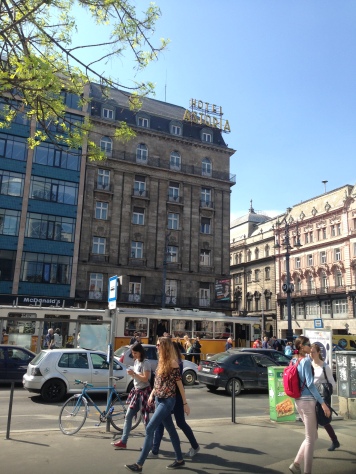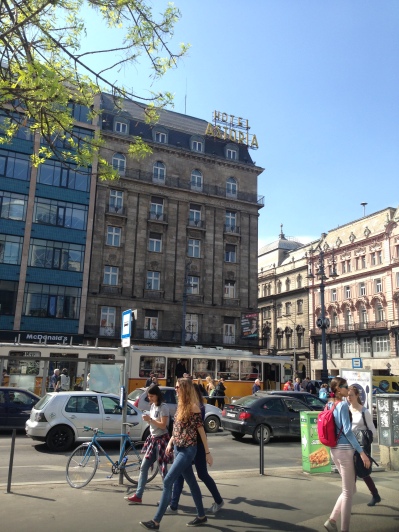Just like in a week’s time the temperature on the digital thermometer has added up ten degrees, at the same time the tourists appeared out of nowhere. They are everywhere: a small group of Germans in the supermarket wondering if Unicum really tastes like Jägermeister, Italians making the streets unsafe with Segways, Brittains celebrating their single lives in a pub and Dutch being delighted by the low prices in restaurants. A place where they are hard to find is on the terrace. Namely, there are none in Budapest.
Now that is jumping to conclusions. There are some terraces, but the terrace culture of the Low Countries –taking outside all the tables when there is just a hint of summer sun – is not there. ‘I miss the terraces’, a Belgian fellow Erasmus student once sighed. ‘In Mechelen, the tables are moved outside when the first ray of sunlight strikes, but here…’
A terrace that has been open since February, is that of the Coffee Company next to the faculty of humanities of the Eötvös Loránd University. The sharp sun lightens up the place, giving it something inviting.
I throw out three rehearsed words of Hungarian – egy tea kerek – and take a seat. It

might be not the most picturesque terrace, since it’s in the middle of downtown Budapest, but that makes it perfect for people watching. A tourist couple – she wears big black sunglasses and a loose-fitting white shirt, him dressed in ripped light blue jeans and a New York Yankees cap – slowly stroll past. A homeless person with a cinnamon brown, furrowed face follows, dragging one of his legs. An older lady in a red suit, blouse of flowers and with gold-trimmed glasses patters ahead of him. A guy carrying a skateboard in his backpack almost bumps into her as his attention is soaked up by his mobile phone screen. The ends of his black, big-pocketed flared pants are worn from being scraped by the street.
A varied crowd it is, but against a not so stylish background. Straight across the terrace a McDonald’s is situated, a street of six motorways and one tram line in between. The dark grey Astoria hotel is not exactly the model of frivolity. The bike stand, meant for by the city council provided rental bikes – so-called Bubi Bikes – is full, because in the inner city cars run the show. Despite someone’s effort to make the sidewalk look more pretty by painting the surfaces between the cracks in blue, red or yellow, the sidewalk remains cracked.
‘There are not enough benches in Budapest’, a Hungarian fellow student once said. ‘The people of Budapest are not happy, because the city is not clean’, the owner of the spiritually themed gift shop thinks. They have got a point, even though Budapest is there for them as well. A city of millions shuts out no one. But when masses are pushing out individuals, it doesn’t necessarily mean that it’s better.

